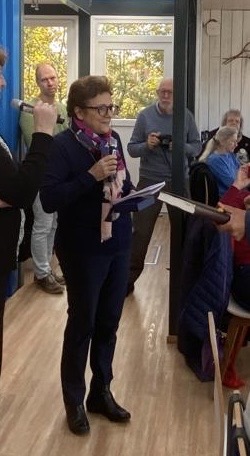Statement from President Ambra Laurenzi
29.02.2024

19.10.2023 - 23.10.2023 Ravensbrück
The meeting of the International Ravensbrück Committee in October this year marked the end of the four-year term of office of the first presidency made up of second-generation members. This transition was understandably not easy, and after an initial phase of disorientation due to the disappearance of the reference points we had previously been familiar with, the new committee has tried to form its own identity and formulate the objectives of its work.
We have made clear the challenges this involves, as the committee is now composed of delegates from the second and in some cases the third generation, who have very different backgrounds and come from countries where the development of a democratic system after World War II and in the decades that followed took different paths, in some cases even impossible, with serious consequences for the population.
It was therefore necessary - beyond these differences - to find a common path based on what unites us: the history of our mothers. A new identity for the Committee can only be created by understanding what the survivors have entrusted to us, both through their testimonies and their concerned appeal for the future.
The accounts of their tragic experiences bear witness to persecution and prevarication, to deprivation of rights, to violence, to suffering and fear. At the same time, however, they also tell us of strength, resistance, courage, solidarity, sacrifice and faith. All of this reveals the complexity of human nature, and thus we must not limit ourselves to remembering the - quite complex - history of their deportation and passing it on to future generations, but we have a duty to learn the appropriate lessons from their experiences.
We must therefore deal with the contradiction of a past that now lies almost 80 years in the past and which needs to be addressed looking to the future so that history does not repeat itself. To this end, it is essential to read today's events through the eyes of those who have already experienced such events in the past, even if they are now expressed in modern forms and terms.
The committee must agree on this goal to ensure that other mothers, other fathers, other children do not have to go through the tragic experiences of deportation and persecution ever again, even though Europe and the world have long since embarked on a path which, with the escalation of latent conflicts and the outbreak of new wars, does not seem to lead to peace. Our task of passing on the memory is therefore becoming ever more urgent and must awaken conscience, which in the 2000s seems to have lost the concept of humanity and the value of life. In view of the tragic events that are currently unfolding, the Committee cannot refrain from publishing statements that convey the fears, anxieties and warnings of people who lived through one of the darkest periods in history.
Communicating the history of deportation - especially its causes and consequences - is an objective whose realisation must also include the search for suitable tools and forms of expression aimed at the new generations, All the initiatives presented by the delegates from the respective countries are essential to achieving these goals, as are some projects that may seem ambitious, but which I am nevertheless convinced we can realise.
The annual meeting in October 2023 made it possible to reflect on all these issues and showed us that the new committee, even if it is perhaps not entirely stable on its feet yet, will find its way to honour the legacy that has been left to us.
The President
Ambra Laurenzi